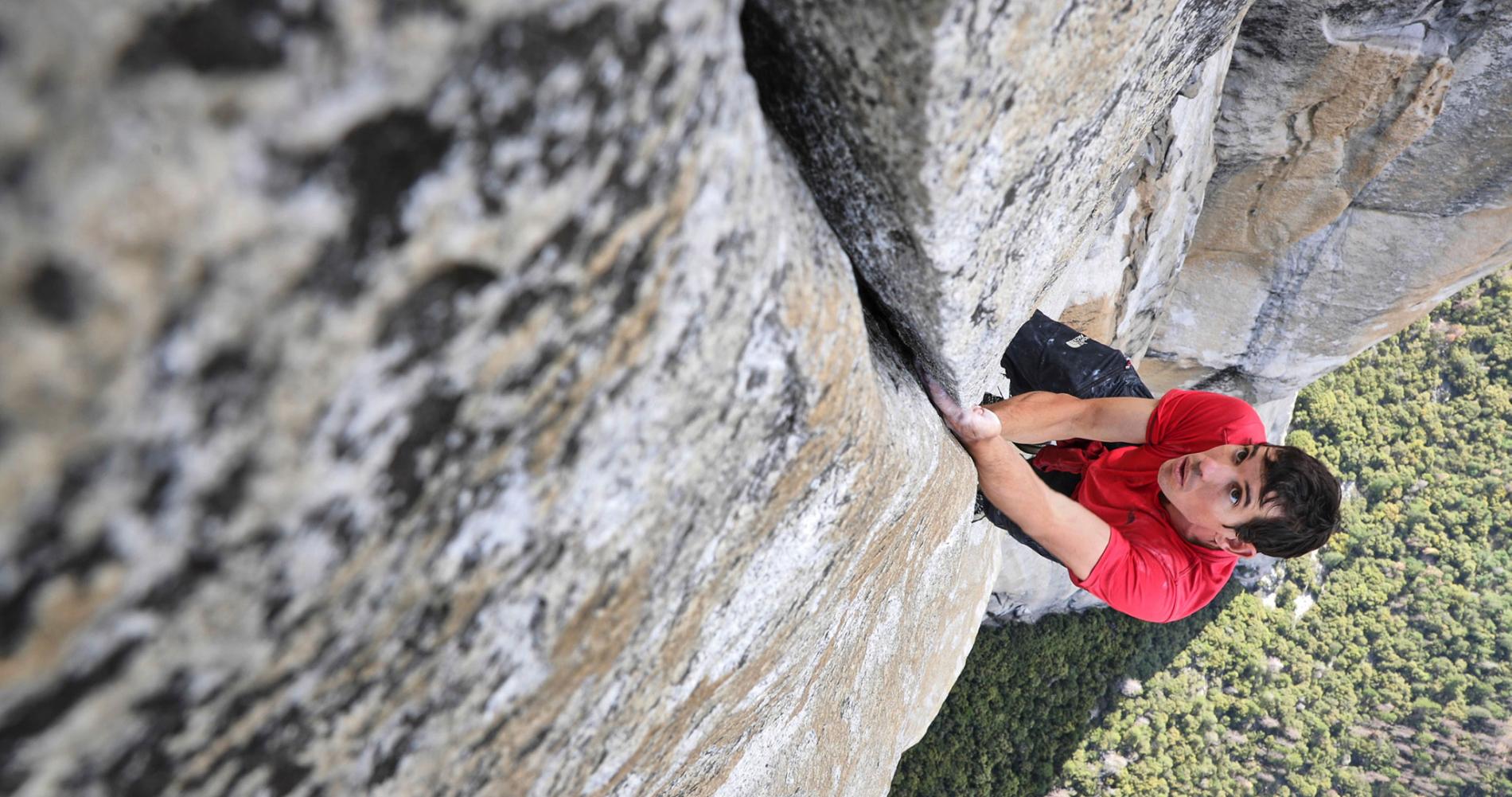
Alex Honnold climbing El Capitan in Yosemite National Park. Photo by Jimmy Chin.
Thoughts by Bryn Clark on Alex Honnold’s Free Solo
The Christian doctrine of imago dei (Latin: ‘image of God’) holds that within each person there exists the stamp of God’s own divine image. “Let us create man in our likeness” the Triune God declares at creation. The practical implications of God’s image in us reverberate through the human existence. This belief is the heart of the Christian story, that God’s image shines through the actions of God’s creation. This can be true even, as National Geographic’s blockbuster film Free Solo shows, by rock climbing.
Free Solo follows Alex Honnold, a world-renowned climber, as he attempts to free solo El Capitan in Yosemite National Park. If your stomach didn’t drop with that sentence, then some definitions are needed.
El Capitan is a 3,000-foot vertical rock wall in Yosemite Valley. It is regarded as an iconic, harrowing rite of passage for the world’s most elite climbers. Just looking at the wall is awe-inspiring. Ascending El Cap is more than a physical feat; it’s a challenge of intricate problem-solving that defies conventional athletics.
In addition, “free solo” is not just an apt (and unfortunate) description of my senior prom. The term also connotates a mode of rock-climbing that involves a) no belayer because b) there are no ropes.
Free Solo is about a man who decides to climb a bare-faced cliff that’s nearly three times the height of the Eiffel Tower with no rope, no safety net, no superman cape…nothing.
The film itself is a must-see, not just for climbers but for anyone (who doesn’t have vertigo). The footage is, simply put, fantastic. The film’s directors, Elizabeth Vasarhelyi and Jimmy Chin, interweave breath-taking filmography with a story whose questions pulse beyond its immediate scope. From grand panoramas of Yosemite Valley to intricate snapshots El Cap’s granite composition, imagery is captured with precision and narrative flair.
Free Solo is not just a film about rock climbing. Because beneath Honnold’s daring endeavor, lies a beautiful testimony to the human spirit and, from a Christian perspective, the imago dei.
The pulsing tension throughout the film is the moral question of Honnold’s decision to take on such a risky adventure. Honnold has a serious girlfriend and many friends who have mixed (putting it softly) emotions about him risking his life. Much of the film is interlaced dialogue regarding his ambition and potential repercussions. Because of the manner in which it is told, Free Solo extends the invitation for viewers to join this conversation.
That said, Free Solo is not just a question of morality: “should Alex take this risk?” The deeper question is one of motivation: “why would he want to?” Risking one’s physical safety goes against the very fiber of our animal instincts. Just like a rabbit has little to gain by challenging himself to poke a fox, Alex’s physical well-being is only ever jeopardized while free soloing. What would possess Alex to do such a thing?
The answer? Imago dei.
God is creative; this is an implicit reality of our very existence. And creativity necessitates risk. The greater the creation, the greater the risk. Thus, God’s creation of free-will involves the risk of rejection and rebellion. God’s incarnation in Christ, as creatively portrayed in John 1, carried an even greater risk, one that God willingly took.
God’s self-giving nature, therefore, includes God’s risk-taking. If we accept the reality of Alex’s God-likeness, of our God-likeness, then the impulse to dare makes sense. We are, after all, created by a God who delights in the objects of God’s creation, a God who finds great joy in the product of creative risk. Why should we not do the same?
At La Vida, we believe that taking risk is a valuable endeavor. Whether in the Adirondack mountains or our Wenham ropes course, we know that growth emerges from the decision to push ourselves beyond conventional realms of safety. Granted, La Vida operates strictly within calculated safety measures (one being: “no climbing without a rope”). But the same human spirit that drives Alex Honnold, drives each La Vida participant as they embrace risk for the sake of growth. Our natural instinct leaves us shaking and fearful; it is our God-likeness that drives us to risk and to grow.
We can watch Free Solo and debate whether or not Honnold’s level of risk was morally justified. Ultimately, that verdict is up to God (though I’m sure his girlfriend would like to weigh-in). But if we stop the conversation there, or just sit in awe of the scenery, then we miss out on the greater opportunity that Free Solo offers. Free Solo invites us to embrace a story about the human spirit, which, ultimately, is the story of God’s creative image lived out in each of us.
